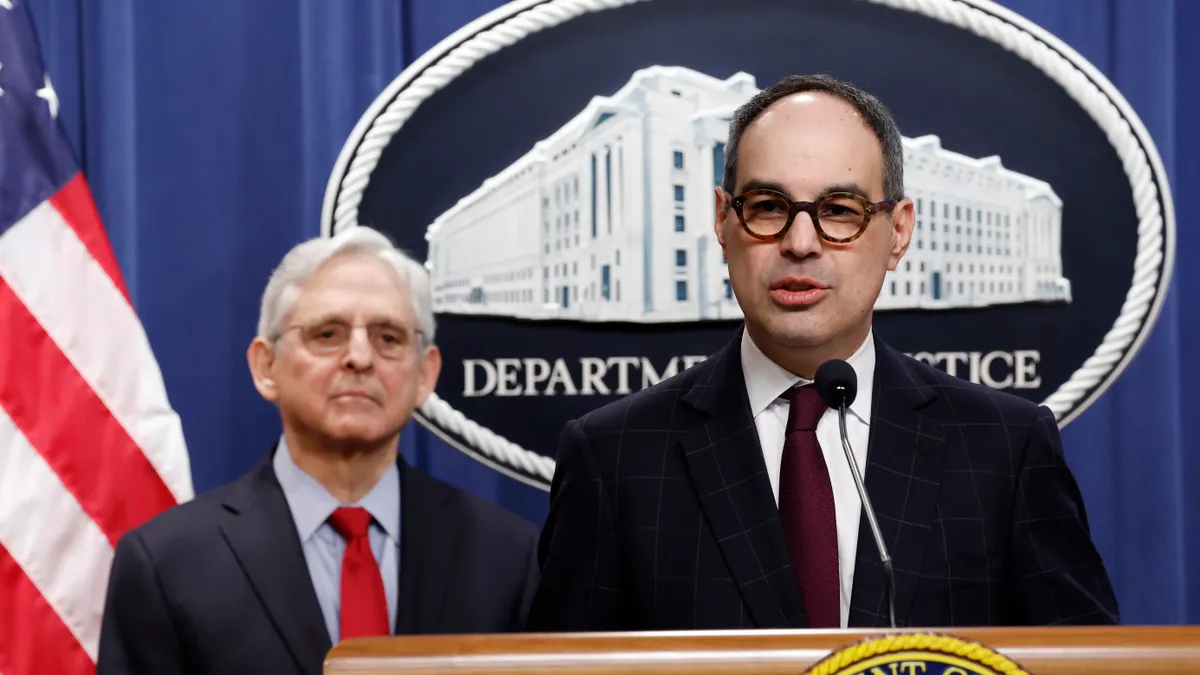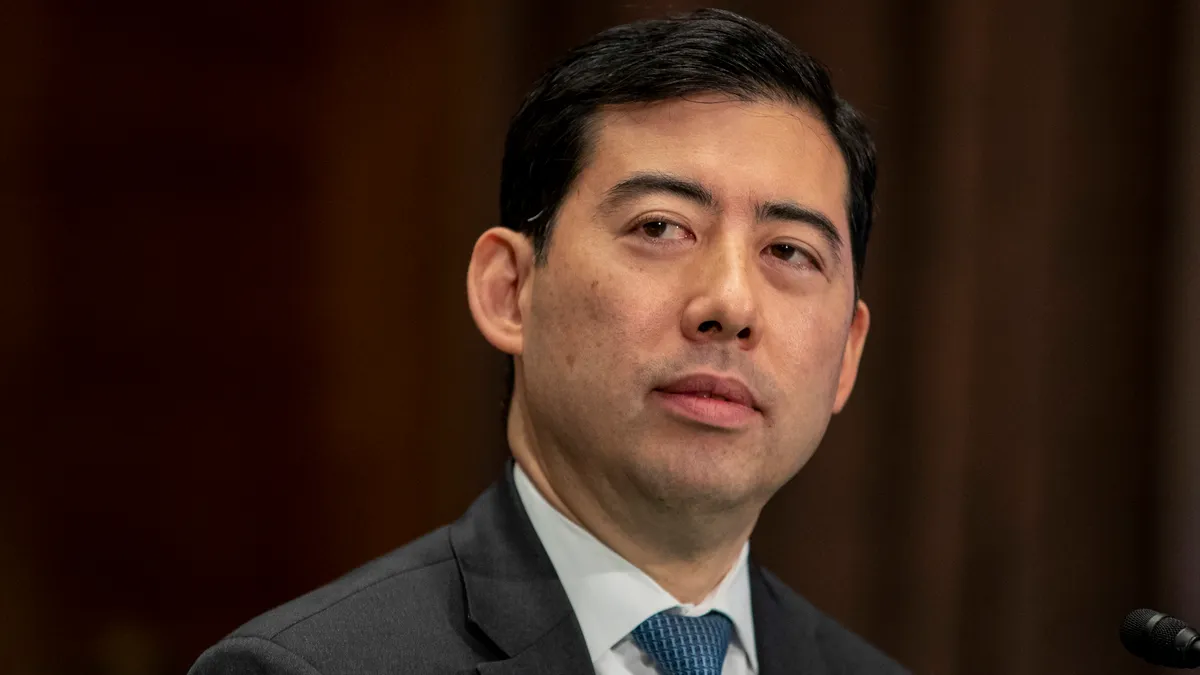The complaint the Department of Justice filed March 21 against Apple over its smartphone dominance is the start of an antitrust battle that will likely take years to bring to a close, and when it does end, the chances are good Apple will come out the winner, several antitrust specialists think.
The government says Apple has grabbed 65% of the U.S. smartphone market and 70% of the U.S. premium smartphone market by using contractual restrictions and technical hurdles to keep app developers tied to the company’s ecosystem, harming innovation and keeping costs high and choices restricted for consumers.
“We allege that Apple has maintained monopoly power in the smartphone market, not simply by staying ahead of the competition on the merits, but by violating federal antitrust law,” Attorney General Merrick Garland said in a statement.
In its complaint, the agency says Apple’s approach is similar to what Microsoft was doing 20 years ago when it tried to monopolize the market for Intel-compatible personal computer operating systems by restricting the use of alternative web browsers like Netscape, media players like Apple’s QuickTime and other types of so-called middleware.
“In 1998, Apple co-founder Steve Jobs criticized Microsoft’s monopoly and ‘dirty tactics’ in operating systems to target Apple, which prompted the company ‘to go to the Department of Justice’ in hopes of getting Microsoft ‘to play fair,’” the complaint said.
The government largely prevailed in that case, with the court finding Microsoft in violation of Section 2 of the Sherman Act and an appeals court upholding a key aspect of the ruling. DOJ and Microsoft then entered into an agreement that was approved by the court.
By drawing partly on that case, DOJ is effectively saying Apple has a duty to deal with rival software and hardware providers to make those products work more seamlessly with the iPhone, Daniel Francis, a professor at NYU School of Law, told The Wall Street Journal. But that argument faces a tough road in court, he said.
Part of the reason is a Supreme Court ruling that came after the Microsoft case that said businesses can’t be sued under antitrust law for not helping rival companies better compete against them, the Journal reported.
“Can the antitrust laws force a company to redesign its product to make it more compatible with competitors’ products?” Colin Kass, an antitrust lawyer with Proskauer Rose, told The New York Times.
DOJ officials have said the lawsuit isn’t a “refusal to deal” case, the Journal reported. Instead, it’s a case about how Apple is exploiting its market dominance to block anyone who could challenge it, which is what the Microsoft case was about.
“They are essentially telling the court that they don’t have to create a whole new theory,” Jeane Thomas, a partner at Crowell & Moring’s antitrust group, told the Journal. “There is precedent for finding monopoly conduct in this kind of situation.”
But Microsoft had a much more commanding market share than Apple has today, Adam Kovacevich, CEO of Chamber of Progress, has said. Microsoft had close to a 95% share of the operating system market for Intel-compatible personal computers, compared to the 65-70% market share that DOJ claims Apple has.
What’s more, DOJ has defined the relevant markets as U.S. markets, but that's not how Apple sees its markets. The iPhone is sold globally, making that the more appropriate market, an Apple spokesperson has said.
Apple is likely to argue that the government is trying to capture a market definition that serves its own purposes, Sam Weinstein, a professor at the Cardozo Law School at Yeshiva University, told the Journal. “There may be lots of bad conduct by Apple, but proving a monopoly may be difficult,” he said.
Apple will also likely argue that its walled-garden approach — the restrictions it places on apps — that the government sees as monopolistic behavior is actually the very thing that consumers like about the company, and why they stay with it. Not only does it create the experience they expect, but also helps ensure apps are free from fraud, privacy intrusions and malware.
That’s an argument the company made successfully in fending off the brunt of an antitrust challenge from Epic Games, the maker of Fortnite, which sued it in 2020 for forcing it to distribute its game only through Apple’s app store. The judge in that case, in her 2021 ruling, agreed with Apple that there was a valid interest in their app policies for security purposes.
“The Court finds that centralized distribution through the App Store increases security in the ‘narrow’ sense, primarily by thwarting social engineering attacks” and also that “app distribution restrictions increase security in the ‘broad’ sense by allowing Apple to filter fraud, objectionable content, and piracy during app review while imposing heightened requirements for privacy,” the decision said.
Implicit in the DOJ complaint is the admission that Apple obtained its monopoly lawfully, according to Lloyd Constantine, an attorney with law firm Constantine Cannon. The complaint only alleges Apple is maintaining its monopoly illegally, something Constantine called very important since the tech giant has consistently adhered to its “walled garden” approach from its early days.
“If they got their monopoly lawfully, which again is tacitly admitted in this complaint, then, in what ways did they begin to maintain that monopoly unlawfully?” Constantine said in an interview with Payments Dive.
Joe Coniglio, a competition policy specialist with the Information Technology and Innovation Foundation, calls the government’s attack on Apple a clear example of antitrust overreach.
“Apple’s carefully integrated ecosystem has created a seamless, secure, high-quality user experience that has clearly benefited American consumers,” he said in an email to Legal Dive. “Apple will also almost certainly be able to provide strong procompetitive justifications for its policies and product design decisions. Given applicable legal standards, that should prove sufficient to rebut the DOJ’s claims.”
“To win in court, you need to have really strong claims,” University of Arizona Law Professor Barak Orbach told Payments Dive. “I'm not so sure that I see in the complaint that was filed very strong claims. Now, it could be that they have some smoking gun evidence. But until it is introduced, it will be very difficult to win in court.”
Apple has said it would file a motion to dismiss the case within the next two months.



















